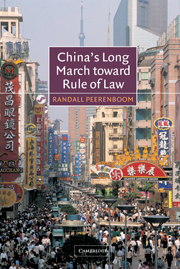Book contents
- Frontmatter
- Contents
- Preface
- List of abbreviations
- 1 Introduction
- 2 The evolution of rule of law in China: the role of law in historical context
- 3 Post-Mao reforms: competing conceptions of rule of law
- 4 Rule of law and its critics
- 5 Retreat of the Party and the state
- 6 The legislative system: battling chaos
- 7 The judiciary: in search of independence, authority, and competence
- 8 The legal profession: the quest for independence and professionalism
- 9 The administrative law regime: reining in an unruly bureaucracy
- 10 Rule of law and economic development
- 11 Rule of law, democracy, and human rights
- 12 Conclusion: the future of legal reform
- References
- Index
8 - The legal profession: the quest for independence and professionalism
Published online by Cambridge University Press: 20 July 2009
- Frontmatter
- Contents
- Preface
- List of abbreviations
- 1 Introduction
- 2 The evolution of rule of law in China: the role of law in historical context
- 3 Post-Mao reforms: competing conceptions of rule of law
- 4 Rule of law and its critics
- 5 Retreat of the Party and the state
- 6 The legislative system: battling chaos
- 7 The judiciary: in search of independence, authority, and competence
- 8 The legal profession: the quest for independence and professionalism
- 9 The administrative law regime: reining in an unruly bureaucracy
- 10 Rule of law and economic development
- 11 Rule of law, democracy, and human rights
- 12 Conclusion: the future of legal reform
- References
- Index
Summary
A competent and independent legal profession is generally assumed to be necessary for rule of law. Thus the original law and development movement in the 1960s made legal education reform and legal training a high priority. Even today, the new law and development movement continues to take the establishment of a competent and independent legal profession as one of the cornerstones of rule of law and to devote considerable resources to the education and training of lawyers.
Although most thin versions of rule of law do not include express reference to the legal profession among the listed elements, most advocates of thin theories take care to point out that the stipulated elements are not meant to be exhaustive and that rule of law requires in addition various institutions, of which a legal profession is one. Indeed, the need for a legal profession follows from typical elements of a thin theory. The requirements that laws be published and that there be congruence between law on the books and law in practice assumes that there are legal professionals to interpret and apply rules. Impartial and fair trials require representation by someone who knows the law and is independent of the judges deciding the cases and the political authorities who made the laws.
Not surprisingly, an independent legal profession is a prominent feature of thick conceptions of rule of law that emphasize human rights.
- Type
- Chapter
- Information
- China's Long March toward Rule of Law , pp. 343 - 393Publisher: Cambridge University PressPrint publication year: 2002



